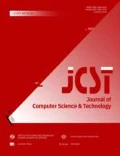Abstract
This paper deals withmodel generation for equational theories, i.e., automatically generating (finite) models of a given set of (logical) equations. Our method of finite model generation and a tool for automatic construction of finite algebras is described. Some examples are given to show the applications of our program. We argue that, the combination of model generators and theorem provers enables us to get a better understanding of logical theories. A brief comparison between our tool and other similar tools is also presented.
Similar content being viewed by others
References
Zhang Jian. Search for models of equational theories. InProc. 3rd Int'l Conf. for Young Computer Scientists (ICYCS-93), Beijing, 1993, pp. 2.60–63.
McCune W. Single axioms for groups and Abelian groups with various operations.J. Automated Reasoning, 1993, 10(1): 1–13.
Neumann B H. Yet another single law for groups.Illinois J. of Math., 1986, 30(2): 295–300.
Slaney J. FINDER: Finite domain enumerator. Version 3.0 notes and guide. Australian National University, 1993.
McCune W, Wos L. The absence and the presence of fixed point combinators.Theoretical Computer Science, 1991, 87(2): 221–228.
Wos L. The kernel strategy and its use for the study of combinatory logic.J. Automated Reasoning, 1993, 10(3): 287–343.
Wos L. Automated reasoning and Bledsoe's dream for the field. InAutomated Reasoning: Essays in Honor of Woody Bledsoe, Boyer R S (ed), Kluwer Academic Publishers, 1991.
Fujita M, Slaney J, Bennett F. Automatic generation of some results in finite algebra. InProc. 13th Int'l Joint Conf. on Artif. Intel. (IJCAI-93), 1993, pp.52–57.
Slaney J, Fujita M, Stickel M. Automated reasoning and exhaustive search: Quasigroup existence problems.Computers and Mathematics with Applications, to appear.
Hasegawa R, Koshimura M, Fujita H. MGTP: A parallel theorem prover based on lazy model generation. InProc. 11th Int'l Conf. on Automated Deduction (CADE-11), LNAI 607, Springer, 1992, 776–780.
Zhang H. Sato: A decision procedure for propositional logic.AAR Newsletter, No. 22, March 1993.
Author information
Authors and Affiliations
Additional information
Zhang Jian received his B.S. and M.E. degrees in computer science from University of Science and Technology of China, in 1988 and 1991, respectively. He completed and defensed his Ph.D. thesis in the spring of 1994. Now he is a researcher at the Institute of Software, The Chinese Academy of Science, Beijing. His research interests include automated reasoning, formal specifications, equational logic and temporal logic. Most recently, he has been working on the automatic generation of finite models of given logical theories. He is a member of the Association for Automated Reasoning.
Rights and permissions
About this article
Cite this article
Zhang, J. Automatic construction of finite algebras. J. of Compt. Sci. & Technol. 10, 206–213 (1995). https://doi.org/10.1007/BF02943488
Received:
Revised:
Issue Date:
DOI: https://doi.org/10.1007/BF02943488




